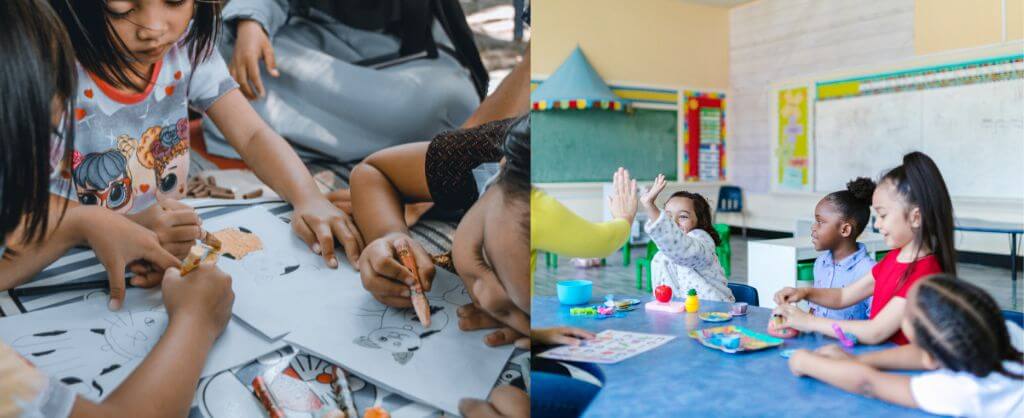How to Enhance Language Skills in Children: A Guide for Parents and Caregivers

The acquisition of language is a remarkable journey that every child begins from the earliest stages of life. As parents and caregivers, we play a crucial role in supporting and nurturing this essential aspect of our children’s linguistic journey.
By implementing effective strategies, we can create a language-rich environment that fosters communication skills, vocabulary expansion, and linguistic confidence.
In this article, we will explore practical strategies to facilitate the growth of language skills in children.
Create a Language-Rich Environment
One of the most powerful ways to support the growth of language skills is by creating an environment filled with rich and varied language experiences.
Engage your child in conversations, narrate daily activities, and describe objects and events around them.
Surround them with age-appropriate books, music, and educational resources that expose them to diverse vocabulary and language patterns.
Read Aloud and Share Stories
Reading aloud to your child is a valuable activity that cultivates a love for reading while enhancing language skills. Choose books with colorful illustrations, engaging stories, and appropriate language complexity.
Encourage interactive reading sessions where your child can ask questions, discuss the story, and make connections. This fosters comprehension skills, vocabulary acquisition, and an understanding of narrative structures.
Engage in Conversations
Engaging in meaningful conversations with your child provides ample opportunities to improve their communication skills. Encourage open-ended questions, active listening, and turn-taking during conversations.
Respond attentively to their thoughts, ideas, and observations, fostering their ability to express themselves confidently. Remember to model proper speech, grammar, and vocabulary usage during conversations.
Promote Play-Based Learning
Play is a powerful tool for helping children develop their language skills. Encourage activities like imaginative play, role-playing, and storytelling to stimulate their language abilities.
Provide props, puppets, or toys that inspire creativity and encourage your child to use descriptive language, engage in dialogue, and construct narratives. Play-based learning enhances vocabulary, social interaction, and storytelling abilities.
When children engage in imaginative play, they use their creativity to create stories and explore different situations.
This helps them practice using language as they communicate with others and describe what they’re doing. For example, playing in a pretend kitchen can involve talking about recipes and ingredients, which expands their vocabulary.
Use Technology Wisely
Use technology wisely when supporting your child’s learning. Choose age-appropriate educational apps, games, and books.
Discuss what your child sees and experiences with technology. Encourage questions and conversations to deepen their understanding.
Limit screen time and prioritize real-world interactions. Outdoor play, reading physical books, imaginative play, and socializing are important too.
By balancing technology use with real-life experiences, you can help your child learn and grow. Remember, technology is a tool to enhance learning, not replace human connections.
Embrace Bilingualism and Multiculturalism
If your family speaks multiple languages or comes from diverse cultural backgrounds, embrace and encourage bilingualism. Exposing children to different languages broadens their linguistic capabilities and cultural understanding.
Maintain consistent exposure to both languages, provide opportunities for language practice, and celebrate multicultural traditions to reinforce language skills.
Seek Out Social Interactions
Encourage opportunities for your child to interact with peers, siblings, and extended family members. Social interactions provide a platform for practicing communication skills, turn-taking, active listening, and negotiation.
Enroll them in playgroups, preschool programs, or community activities that foster social connections and language-rich environments.
Celebrate Mistakes and Provide Positive Reinforcement
Learning involves trial and error. Encourage your child when they try new words, sentences, and grammar. When they make mistakes, gently correct them without overwhelming them.
Offer positive reinforcement, praise their efforts, and create a safe and supportive environment that encourages risk-taking and growth.
Conclusion
Children’s language growth is a remarkable journey that calls for nurturing, patience, and support from parents and caregivers.
By creating a language-rich environment, engaging in conversations, promoting play-based learning, and embracing bilingualism, we can lay a strong foundation for our children’s linguistic abilities.
Remember, every child develops at their own pace, so offer love, encouragement, and ample opportunities for language exploration.
Together, let us celebrate the joy of communication as our children embark on their exciting language journey.









